James Cook Ayer
James Cook Ayer (5 May 1818 in Groton, Connecticut – 3 July 1878 in Winchendon, Massachusetts) was the wealthiest patent medicine businessman of his day.[1]
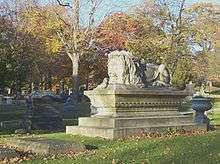
Early life
At the age of 13, he moved to Lowell, Massachusetts, and resided there with his uncle. Ayer was also brother of wealthy industrialist Frederick Ayer.
His education was obtained at the public schools, where at one time he was a classmate of Gen. Butler, and subsequently at the Westford Academy, after which he was apprenticed to James C. Robbins, a druggist in Lowell. While there he studied medicine, and later he graduated from the medical school of the University of Pennsylvania.[2]
Career
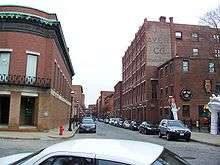
Ayer never practiced medicine, but devoted his principal attention to pharmaceutical chemistry and the compounding of medicines. His success in this line was very great, and soon led him to establish a factory in Lowell for the manufacture of his medicinal preparations, which became one of the largest of its kind in the world, and was magnificently equipped. He accumulated a fortune estimated at $20,000,000.[2]
Much of his success was due to his advertising, on which he spent $140,000 a year, and he annually published an almanac, distributing 5,000,000 copies each year.[3] Editions in English, French, German, Portuguese, and Spanish, were regularly issued. In 1874 he accepted the Republican nomination for the United States Congress in the 7th Massachusetts District, but was defeated.[2]
In addition to his patent medicine business, Dr. Ayer was involved in textile production in Lowell, Massachusetts with his brother.
Personal life
His son, Frederick Fanning Ayer, born 1851, became a lawyer and philanthropist, and was director or stockholder of many corporations.[4]
.jpg)
He died in an insane asylum on July 3, 1878 and is interred at Lowell Cemetery.[1]
Legacy
The monument at Ayer's gravesite, a life-size marble lion sculpted by Albert Bruce-Joy, is one of the best known at Lowell Cemetery.[5][6]
The town of Ayer, Mass., was named after him.[3]
Gallery
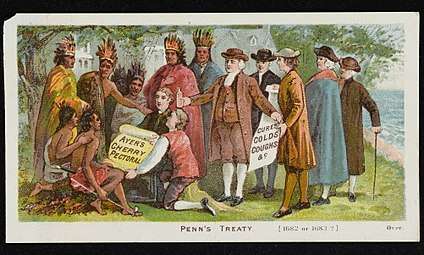 Advert for Ayers Cherry Pectoral
Advert for Ayers Cherry Pectoral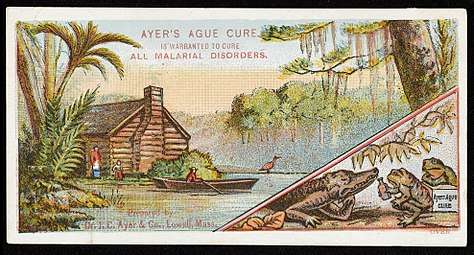 Advert for Ayers Ague Cure
Advert for Ayers Ague Cure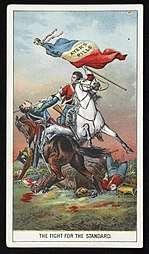 Advert for Ayers Pills
Advert for Ayers Pills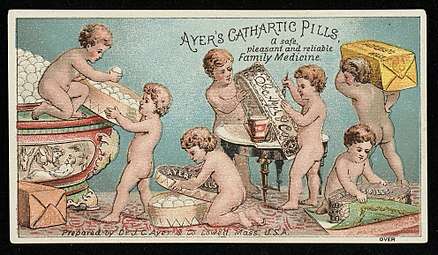 Advert for Ayers Cathartic Pills
Advert for Ayers Cathartic Pills
References
- "Obituary" (PDF). The New York Times. July 4, 1878. Retrieved 2008-12-20.
-

- "James Cook Ayer, Sarsaparilla King of Lowell, Mass. - New England Historical Society". 2014-05-05. Retrieved 2016-08-17.
- Short Bio on F.F. Ayer, 1914
- Camire, Chris (June 16, 2016). "What a site! The Lowell Cemetery celebrates its 175th anniversary and the 'serenity of nature'". The Sun. Retrieved 26 August 2019.
- Howe, Jr., Richard P. (Nov 16, 2015). Lowell. Arcadia Publishing. p. 45. ISBN 1467134015. Retrieved 26 August 2019.
External links
| Wikimedia Commons has media related to James Cook Ayer. |
- Article about Dr Ayer
- Myths refuted about Dr. James Cook Ayer With more information about his products and life.
- Coburn, Frederick William (1920). History of Lowell And Its People, Volume 2. New York: Lewis Historical Publishing Company. pp. 16–22. Retrieved 2009-08-23.
ayer.
| Library resources about James Cook Ayer |
| By James Cook Ayer |
|---|